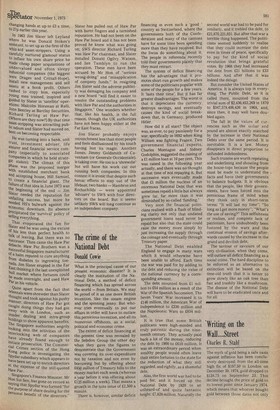The crime of the National Debt
Donald Cowie
What is the principalcause of our present economic disaster? It is clearly the institution of the National Debt, a method of deficit financing which has spread across the world — from Britain. We may be proud of it as one more British invention, like the steam engine and the spinning jenny. But whoever tries eventually to put our affairs in order will have to outlaw this pernicious invention, and all its numerous offshoots, as a social, political and economic crime.
The extent of deficit financing at the present time was revealed by the Selsdon Group the other day when they gave the figures to demonstrate that the Government was covering its over-expenditure not by taxation and not even by borrowing but by offering about £450 million of Treasury bills to the money market each week (whereas a year before it was offering about £125 million a week). That means a growth in the note issue of £2,500 a minute.
There is, however, similar deficit financing in even such a 'good ' country as Switzerland, where the governments both of the Confederation and many of the cantons have for some time been spending more than they have received. But the Swiss do something about it. The people in referenda recently told their governments plainly that they must retract.
The system of deficit financing has the advantages that it promotes short-run growth and makes some of the politicians popular with some of the people for a few years. It 'lasts their time'. But it has far greater disadvantages. The worst is that it depreciates the currency, destroys savings, and eventually causes the kind of social breakdown that, in Germany, produced Hitler.
How did it all start? The object was, as ever, to pay painlessly for a war, specifically in 1692 when King William was fighting France. Two government financial experts, Charles Montague and Sidney Godolphin, suggested the raising of a £1 million loan at 10 per cent. This was raised in the following year actually, and there was no thought at that time of not repaying it. But successive wars eventually made that £1 million the nucleus of an enormous National Debt that was sometimes repaid a little but always grew far, far more than it was diminished by so-called 'funding.'
Very soon the financial politicians realised with a flash of blinding clarity not only that undated government loans need never be repaid but also that the state could raise the money more simply by just increasing the supply through the coinage and eventually through Treasury paper.
The National Debt enabled England to engage in many wars which it would otherwise have been unable to afford. Each time the war was paid for by adding to the debt and reducing the value of the national currency by a corresponding amount.
The debt mounted from. £1 million to £54 million as a result of the War of the Spanish Succession. The Seven Years' War increased it to £146 million, the American War of Independence to £230 million and the Napoleonic Wars to £834 million.
It is true that some British politicans were high-minded and truly patriotic during the nineteenth century. They actually paid back a lot of the money, reducing the debt by 1900 to £610 million. It was an extraordinary period when wealthy people would often leave their entire fortunes to the state for the reduction of what they still regarded, and rightly, as a shameful debt.
Alas, the first world war had to be paid for, and it forced up the National Debt by 1920 to an unheard-of and quite fantastic height: £7,828 million. Naturally the second world war had to be paid for similarly, and it trebled the debt, to £21,870,221,651. But after that war a terrible thing happened. The politicians seemed suddenly to realise that they could increase the debt even in times of peace, specifically to pay for the kind of social revolution that brings grateful votes. By 1968 they had increased the debt from £21 billions to £33 billions. And after that it was indeed the deluge.
But consider the United States of America. It is always top in every thing. The Public Debt, as it is called there, mounted from the trivial sum of $2,436,453,269 in 1870 to $347,578,406,426 in 1968, and, since then, it may well have doubled again.
The fall in the values of currencies such as the aollar and
pound are almost exactly matched by the increase in their National Debts over the same period. It is inevitable. It is a law. Money disappears in direct proportion to unfunded indebtedness.
Such truisms are worth repeating and underlining and shouting from the house-tops because the people must be made to understand the facts and force their governments to balance budgets. It is obvious that the people, like their governments, have been forced into the pernicious frame of mind when they think only in short-term terms: "It will last my time"; "So long as I get more money"; "What's the use of saving?" This selfishness or realism, and complete lack of patriotism, have undoubtedly been fostered by the wars and the continual erosion of savings afterwards caused by the increase in the grand and devilish debt.
The saviour or saviours of our very civilisation, when they come, will outlaw all deficit financing as a social crime. The hard discipline to be enforced as an alternative to extinction will be based on the time-old truth that it is better to grow slowly like an oak tree than fast and trashily like a mushroom. The disease of the National Debt will have to be eradicated once and for all. marsesmssowspossmarrestrarsowasagarst
































 Previous page
Previous page